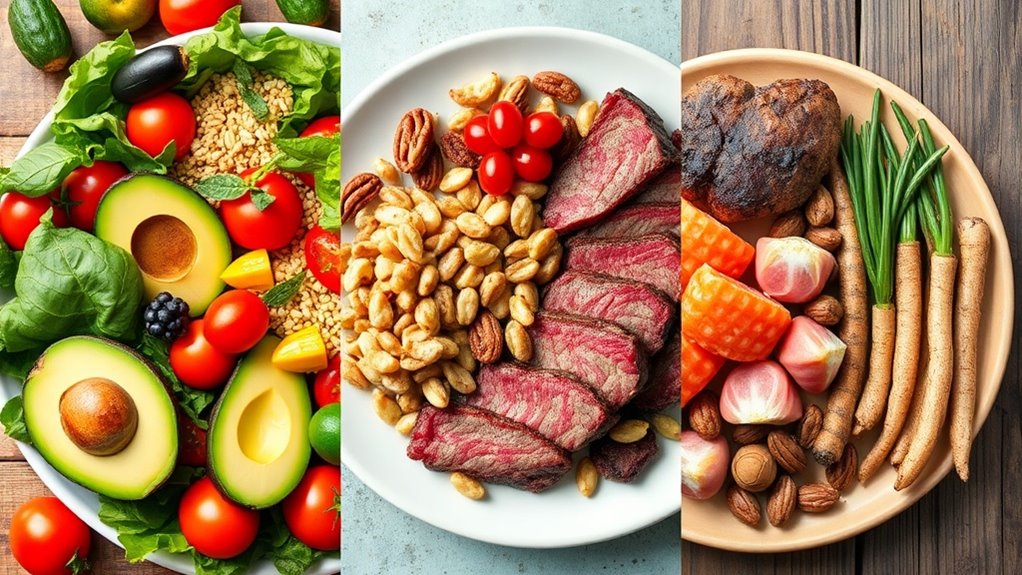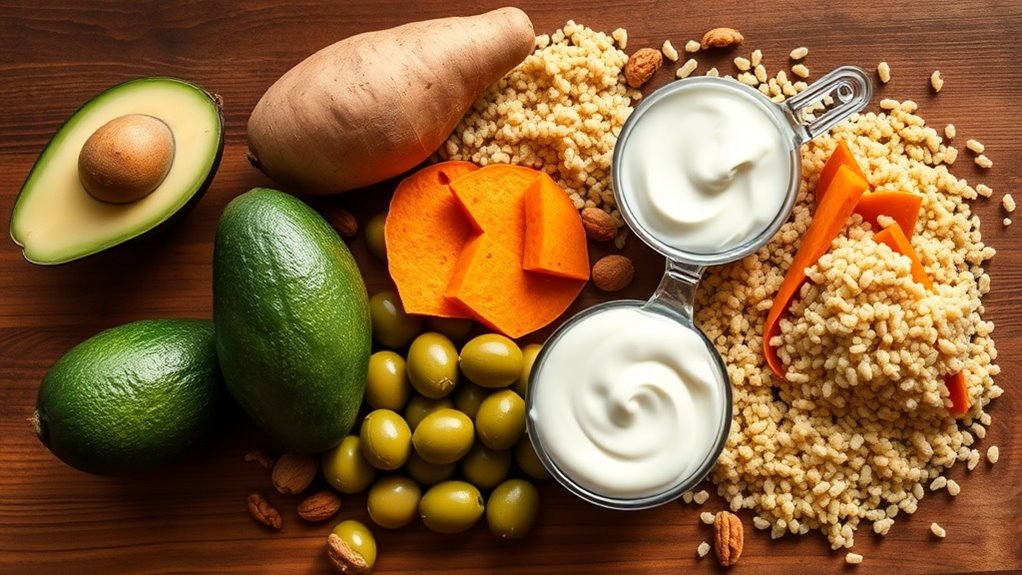Carbs or Fats. Find Out Which One Will Help You Lose Weight Faster!
Like the age-old nutrition debate that’s shaped diets for years, you’re weighing whether to cut carbs or fats to drop weight faster. Reducing carbs can kickstart ketosis for quicker fat burn, yet fats help keep you full and energized. Stick around to uncover which strategy might work best for you.
Key Takeaways
- Low-carb diets can accelerate weight loss by promoting fat burning through ketosis, as supported by studies.
- Reducing carbs often leads to faster initial weight loss compared to cutting fats, per research in the New England Journal.
- Healthy fats enhance metabolism and satiety but may not promote faster loss if consumed in excess.
- Excessive carbs convert to stored fat, making carb restriction a quicker strategy for weight reduction.
- A balanced macronutrient approach, favoring lower carbs, optimizes fat oxidation for sustainable and rapid results.
Understanding Carbohydrates and Weight Loss
Have you ever wondered how carbohydrates impact your weight loss efforts?
Carbs serve as your body’s primary energy source, fueling daily activities and workouts.
When you consume more carbs than you burn, they convert to stored fat, potentially hindering weight loss.
However, not all carbs are equal; complex ones like whole grains provide fiber that keeps you full longer, aiding calorie control.
Balance is key: cutting carbs too drastically can sap your energy, while pairing them with fats in moderation supports overall nutrition without derailing goals.
Evidence shows that mindful carb intake, not elimination, promotes sustainable weight management.
To maximize benefits, consider the timing of carb intake, such as having them after workouts to replenish energy stores.
The Role of Fats in Metabolism
Fats play a vital role in your metabolism, acting as a concentrated energy source that your body taps into for fuel when carbs run low.
They supply essential fatty acids, which you rely on for building cell membranes and producing hormones like testosterone and estrogen.
Evidence shows fats enhance nutrient absorption, particularly fat-soluble vitamins, boosting your immune function.
Through beta-oxidation, fats break down efficiently to produce ATP, sustaining energy levels during low-carb phases.
This metabolic flexibility helps you maintain steady blood sugar and supports long-term health without overloading on simple carbs.
Moreover, healthy fats boost metabolism by requiring more energy to break down than processed carbohydrates, aiding in overall calorie burning.
Comparing Carbs and Fats for Satiety
When it comes to satiety, carbohydrates and fats differ in how they influence your hunger levels.
Carbs, especially refined ones, digest quickly, spiking blood sugar and often leaving you hungry sooner, as studies show they trigger rapid insulin responses.
In contrast, fats break down slowly, promoting prolonged fullness by delaying gastric emptying, which research links to reduced calorie intake over time.
For balance, combining both—like whole grains with healthy fats—enhances satiety best.
You’ll find high-fiber carbs can match fats’ effects, helping you manage portions and support weight loss effectively.
Ultimately, your choices depend on individual responses.
Pairing these with high-fiber foods can enhance overall satiety by incorporating elements like vegetables that promote prolonged fullness.
Effects of Carbs on Energy Levels
You notice that carbs can quickly boost your energy levels, providing the fuel your body needs for daily activities.
When you consume them, you’re likely to experience short energy spikes that enhance alertness and performance.
Yet, over time, relying heavily on carbs might contribute to fatigue, so balancing them with other nutrients is key.
To sustain energy without the crashes, opt for complex carbohydrates that offer stable blood sugar levels and prolonged vitality.
Carbs Boost Energy
Carbohydrates fuel your body as its main energy source, rapidly breaking down into glucose to power cells and sustain activity.
This makes them essential for your daily performance, giving you the vitality needed for both mental and physical tasks.
Here’s how carbs can enhance your energy levels:
- Boost workout endurance: Carbs provide quick fuel for muscles, helping you push through longer sessions without fatigue.
- Support cognitive function: As glucose powers your brain, carbs maintain focus and mental clarity during demanding activities.
- Aid overall stamina: They replenish energy stores efficiently, allowing you to recover faster and stay active throughout the day.
Energy Spikes From Carbs
While carbs provide essential fuel, they can also cause rapid energy spikes by quickly elevating blood sugar levels, offering a burst of vitality that’s ideal for short-term demands but may lead to subsequent crashes if intake isn’t balanced.
You experience this when simple carbs, like those in sugary snacks, hit your bloodstream fast, boosting your performance for quick tasks.
To optimize this, choose complex carbs such as whole grains, which release energy more gradually, supported by studies showing they sustain focus without extremes.
Balancing your diet helps you harness carbs effectively for weight loss goals.
Carbs and Fatigue Effects
Have carbs ever triggered a sudden dip in your energy, turning initial vigor into fatigue?
Yes, studies show that high-glycemic carbs cause rapid blood sugar spikes and crashes, leading to energy slumps that hinder your workouts and weight loss.
This “carb crash” is common but manageable.
Here’s how it works:
- Simple carbs like candy spike blood sugar quickly, giving a short burst before a drop.
- Complex carbs offer steadier energy but can still cause fatigue if overconsumed.
- Hormonal responses, such as insulin surges, amplify the crash, affecting your daily motivation.
How Fats Influence Body Composition
You’ve likely noticed how the fats you eat play a key role in shaping your body composition.
When you include certain dietary fats, they can either build or reduce body fat stores, depending on their type and your overall intake.
Now, let’s explore how these fats affect energy storage and long-term weight management based on current research.
In fact, incorporating healthy fats can enhance satiety and support effective weight loss by keeping you fuller longer.
Fats and Body Fat
Fats play a key role in shaping your body composition, as they directly affect how your body stores energy and builds or maintains muscle and fat tissue.
While fats provide essential energy reserves, they influence your fat mass and lean tissue balance through metabolic processes.
Research shows that excessive fat intake can lead to increased body fat, but moderate levels support hormone production for muscle maintenance.
To understand this better, consider:
- Energy storage: Your body converts excess fats into adipose tissue, acting as a long-term energy source.
- Hormonal effects: Fats help produce hormones like testosterone, which you need to preserve muscle mass.
- Metabolic impact: Balanced fat consumption optimizes your metabolism, preventing fat accumulation while aiding recovery.
Dietary Fats Effects
Understanding how dietary fats shape your body composition can clarify their role in weight management.
You influence your muscle-to-fat ratio by choosing fats wisely; for instance, monounsaturated fats from olive oil enhance fat metabolism, helping you preserve lean mass during weight loss.
Evidence from studies shows omega-3 fatty acids improve insulin sensitivity, reducing overall body fat.
However, saturated fats can promote inflammation if overconsumed, potentially hindering your progress.
Balance is key: incorporate nuts and seeds to support a healthier composition, making weight control more effective.
Aim for variety to maximize benefits.
Fats Storage Impact
While fats are essential for energy, their storage in your body directly shapes composition by promoting fat accumulation in adipose tissue when consumed in excess.
This process influences your weight and health, as research shows fats provide vital functions but can lead to obesity if unbalanced.
You’re in control—manage it wisely with these strategies:
- Prioritize healthy fats: Choose sources like avocados and nuts, which support cell health and reduce inflammation, per nutritional studies.
- Monitor portions: Track intake to avoid surplus calories, helping prevent unwanted fat storage and promoting leaner composition.
- Combine with activity: Engage in regular exercise to burn stored fats, enhancing metabolism and aiding faster weight loss, as evidenced by fitness research.
Carb-Restricted Diets for Faster Results
When you restrict carbs in your diet, you may accelerate weight loss by prompting your body to burn fat for fuel, as supported by studies on low-carb approaches like keto.
This shift, often called ketosis, reduces insulin levels and enhances fat breakdown, leading to quicker initial drops in body weight.
Research, such as from the New England Journal of Medicine, shows low-carb diets can outperform low-fat ones in the short term.
However, balance is key; they’re not suitable for everyone, potentially causing side effects like fatigue or nutrient deficiencies if not planned well.
Consult a professional for personalized advice.
Additionally, while paleo diet emphasizes whole foods for overall health, low-carb methods can offer faster weight loss results through fat adaptation.
Fat-Focused Strategies for Weight Reduction
Focusing on fats in your diet can effectively support weight loss by emphasizing healthy sources like avocados and nuts, which promote satiety and stabilize blood sugar.
You’ll burn more calories through thermogenesis, as studies show fats enhance metabolic rate when chosen wisely.
Here are three evidence-based strategies to incorporate fats effectively:
-
Prioritize unsaturated fats: Opt for olive oil and fatty fish to reduce inflammation and improve heart health, aiding sustained weight loss.
-
Control portion sizes: Measure nuts or seeds to avoid excess calories, ensuring you maintain a deficit without feeling deprived.
-
Combine with protein: Pair fats with lean proteins like eggs for better muscle preservation and appetite control during your routine.
Additionally, integrating foods such as salmon into your meals can provide omega-3 fatty acids to further support fat oxidation and overall metabolic health.
Balancing Macronutrients for Optimal Weight Loss
Balancing macronutrients—carbs, fats, and proteins—helps you achieve sustainable weight loss by optimizing energy levels and metabolism.
Research shows that a balanced ratio, such as 45-65% carbs, 20-35% fats, and 10-35% proteins, supports fat oxidation while preserving muscle mass.
You’re more likely to stick with this approach, as it prevents energy crashes and curbs overeating.
For example, pairing carbs with proteins stabilizes blood sugar, enhancing satiety.
Always adjust based on your activity level and goals; studies emphasize personalization for long-term success, making weight loss effective and enjoyable.
Additionally, incorporating ketosis from the Keto diet can accelerate fat burning for those seeking quicker results.




